Role Playing: Danny McCarthy, pushing broom in ‘The Flick,’ finds vital pulse in long silences
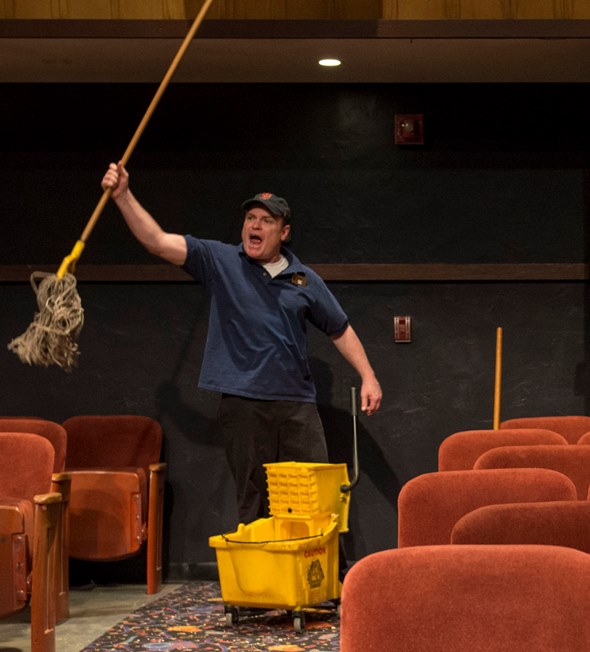 Interview: At unhurried pace of Annie Baker’s play at Steppenwolf Theatre, actor taps into shifting emotional rhythms. Through May 8.
Interview: At unhurried pace of Annie Baker’s play at Steppenwolf Theatre, actor taps into shifting emotional rhythms. Through May 8.
By Lawrence B. Johnson
Danny McCarthy calls it a sweeping-dance, the closely choreographed stretches of, well, sweeping that often – and silently – occupy the two men at the center of Annie Baker’s play “The Flick,” winner of the 2014 Pulitzer Prize for Drama, at Steppenwolf Theatre.
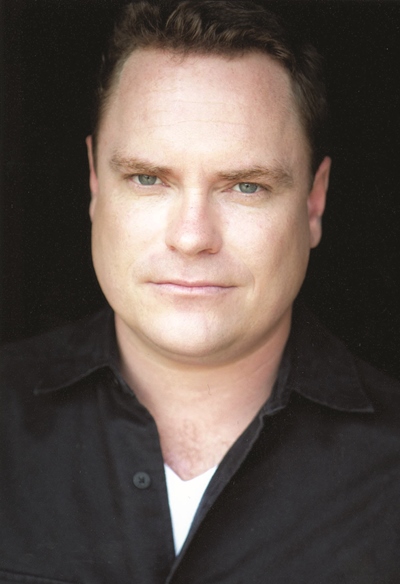 “Actually, you try to stay mentally active while you’re out there,” says McCarthy, who plays Sam, a quiet man in his mid-thirties who works on the cleanup crew at a small movie house, clearing away the night’s detritus, and grapples with the haunting malaise in his life. “Yes, you’re just sweeping, but these are complex characters and your head has to be in the circumstances that change with each scene.”
“Actually, you try to stay mentally active while you’re out there,” says McCarthy, who plays Sam, a quiet man in his mid-thirties who works on the cleanup crew at a small movie house, clearing away the night’s detritus, and grapples with the haunting malaise in his life. “Yes, you’re just sweeping, but these are complex characters and your head has to be in the circumstances that change with each scene.”
In the first moments of a leisurely play that spins out to a little more than three hours in length , Sam and his twentysomething new helper Avery (Travis Turner) are seen in the routine of their job: sweeping up after the night’s last screening has ended. Slowly, and in the irregular way that people get to know each other on the job and find the things they have in common, the two workers patch together lines of communication.
And then there’s pretty Rose (Caroline Neff), the projectionist, who (unbeknownst to her) possesses Sam’s heart and in an impulsive moment makes an unwelcome hit on the mortified Avery. Just a typical portrait of missteps and train wrecks in the workplace.
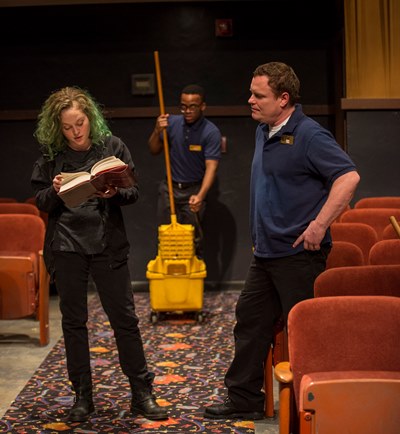 While Rose is given to bursts of exuberance and Avery occasionally stirs from his emotional shell, Sam is the steady one, the mysterious and magnetic one. He’s approaching middle age, quietly. And our connective drift shifts more and more to him. Sam, says McCarthy, is a character portrait constantly in progress.
While Rose is given to bursts of exuberance and Avery occasionally stirs from his emotional shell, Sam is the steady one, the mysterious and magnetic one. He’s approaching middle age, quietly. And our connective drift shifts more and more to him. Sam, says McCarthy, is a character portrait constantly in progress.
“He’s 35, lives with his parents, a guy who didn’t do well in school and now he’s sort of stuck in this position, scraping by, sweeping popcorn in a little movie house,” the actor says. “But he’s not depressed. That’s not his nature. He’s a positive guy, but really lost.
“From night to night, I play around with figuring out what’s going on in his head about this love for Rose,” he says. “He’s sincere, but sometimes I think a part of him wants her to love him back and a part of him doesn’t. Sam’s a guy who has known a lot of disappointment.”
If the connection between Sam and Rose is emotionally fraught, the bond he forms with newbie Avery is just two guys who’ve found a game they both enjoy – and it’s definitely not played with a ball. It’s the Kevin Bacon game of connecting assorted actors through movies, and Avery is beyond good at it. He’s an ace.
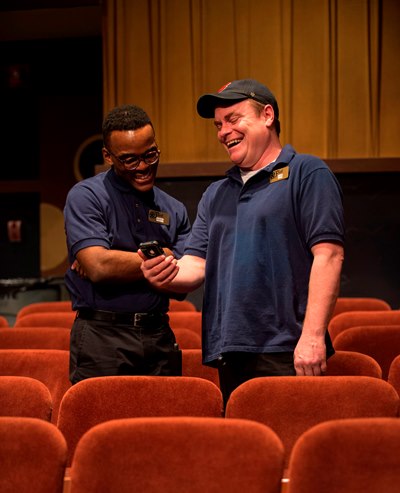 “Sam just enjoys challenging this young kid, who is very shy and may be on the spectrum,” says McCarthy, “But Sam has really taken to him. The game is a kind of emotional buffer for Sam, who’s not one to chat about deep stuff or reveal much about himself. But he enjoys having fun, and while a lot of things are depressing in his life, the Kevin Bacon game is not. It’s amazing.
“Sam just enjoys challenging this young kid, who is very shy and may be on the spectrum,” says McCarthy, “But Sam has really taken to him. The game is a kind of emotional buffer for Sam, who’s not one to chat about deep stuff or reveal much about himself. But he enjoys having fun, and while a lot of things are depressing in his life, the Kevin Bacon game is not. It’s amazing.
“Their relationship grows into a beautiful thing, but sadly it’s destroyed in the end.”
Ordinary, even banal, as the banter among this threesome may first appear, the playwright progressively leads her characters first into garden-variety miscalculations and ultimately into moral crisis and stunning betrayal. McCarthy sees all the broom-pushing as part of the rhythm of a cleverly constructed emotional catastrophe.
“Annie Baker’s a brilliant writer,” he says. “This play, the pacing, is very real if you’re doing it right. She’s quite specific about the long silent pauses when we’re sweeping. This pause is 20-30 seconds, this pause is possibly a full minute.
“The silences are important. And Dexter (director Dexter Bullard) emphasized that with each new scene, everybody’s head should be in a fresh place. You’re doing the same thing again, sweeping, but it’s a different day and you bring a different kind of energy, subtle differences in body language. Even the smallest alteration is important.
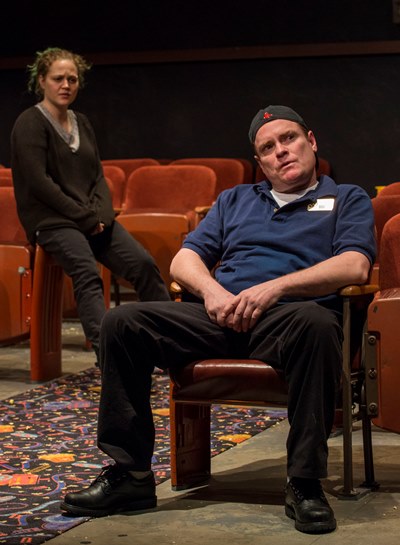 “All the actors have become good at not making it the same every night. You clearly don’t want to affect the basic trajectory of the play, but without some variations you won’t feel like anything is real. Caroline and Travis are very good at letting it be this constantly evolving play.”
“All the actors have become good at not making it the same every night. You clearly don’t want to affect the basic trajectory of the play, but without some variations you won’t feel like anything is real. Caroline and Travis are very good at letting it be this constantly evolving play.”
The key danger in varying the wordless sweeping, says McCarthy, is overthinking it. “Your mind can’t be racing. But it’s also pretty exciting – really, this is different from anything I’ve ever done before. I don’t even need a normal prep time.
“I don’t get my head in the game until places are called. Maybe it’s cheating, but in that first scene, when Sam shows Avery how to sweep – the ‘walk-through’ – there’s plenty of time then to get into the flow. If I need an emotional warm-up, that first scene is my opportunity.”
The show’s long run has also produced another twist for McCarthy, honing an unsuspected talent: “I’ve become quite the sweeper.”
Editor’s note: Danny McCarthy leaves Steppenwolf’s production of “The Flick” before its final performances May 5-8. He will be replaced by Danny Wolohan.
Related Links:
- Review of ‘The Flick’: Read it at ChicagoOntheAisle.com
More Role Playing Interviews:
- Mierka Girten, actor with MS, knows wound behind her character’s scars
- Sandra Marquez, as Clytemnestra, sees an exceptional woman in the Greek queen
- Brian Parry says he summoned courage before wit as George in ‘Virginia Woolf’
- Tracy Michelle Arnold debunks madness as force that drives Blanche DuBois
- Christopher Donahue, as Ahab, finds sea’s depth in sadness of a vengeful soul
- Lance Baker embodies ennui, despair of fugitive Jews in ‘Diary of Anne Frank’
- Francis Guinan embraces conflict of father who fled from grim truth in ‘The Herd’
- Sophia Menendian reached back (but not far) as plucky Armenian refugee of 15
- Lindsey Gavel’s distressed Masha, in ‘Three Sisters,’ began with a touch of cheer
- Hollis Resnik felt personal bond with zealous, skeptical scholar in ‘Good Book’
- A.C. Smith is ready undertaker, lord of diner world in ‘Two Trains Running’
- Lia D. Mortensen’s intense portrait of a mentally failing scientist holds mirror to life
- Siobhan Redmond sees re-formed Lady Macbeth as valiant queen in ‘Dunsinane’
- Eileen Niccolai harnessed a storm of emotions to create spark in Williams’ Serafina
- Steve Haggard, aiming at reality, strikes raw core of grieving man in ‘Martyr’
- Shannon Cochran found partners aplenty in sardonic, twice-told ‘Dance of Death’
- Natalie West scaled back comedy to nail laughs, touch hearts in ‘Mud Blue Sky’
- Dave Belden, actor and violinist, adjusted pitch for ‘Charles Ives Take Me Home’
- Joseph Wiens starts at full throttle to convey alienation of ‘Look Back in Anger’
- Shane Kenyon touches charm and hurt of lovable loser in Steep’s ‘If There Is’
- Ramón Camín sees working class values in Arthur Miller’s tragic Eddie Carbone
- Hillary Marren’s charming, rapping witch in ‘Woods’ shapred by hard work, free play
- Mary Beth Fisher embraces both hope, despair of social worker in ‘Luna Gale’
- Brad Armacost switched brothers to do blind, boozy character in ‘The Seafarer’
- Karen Woditsch shapes vowels, flings arms to perfect portrait of Julia Child
- Ora Jones had to find her way into Katherine’s frayed world in ‘Henry VIII’
- Kareem Bandealy tapped roots, hit books for form warlord in ‘Blood and Gifts’
- Eva Barr explored two personas of Alzheimer’s victim to find center of ‘Alice’
- Darrell W. Cox sees theater’s core in closed-off teacher of ‘Burning Boy’
- Chaon Cross turned Court stage into a romper room finding answers in ‘Proof’
- Dion Johnstone turned outsider Antony to bloody purpose in ‘Julius Caesar’
- Noir films gave Justine Turner model for shadowy dame in ‘Dreadful Night’
- Anish Jethmalani plumbs agony of good man battling demons in ‘Bengal Tiger’
- Gary Perez channels his Harlem youth as quiet, unflinching Julio in ‘The Hat’
- Kamal Angelo Bolden sharpened dramatic combinations to play ‘The Opponent’
- In wheelchair, Jacqueline Grandt explores paralysis of neglect in ‘Broken Glass’
- James Ridge thrives in cold skin of Shakespeare’s smiling serpent, Richard III
- Stephen Ouimette brews an Irish tippler with a glassful of illusions in ‘Iceman’
- Ian Barford revels in the wiliness of an ambivalent rebel in Doctorow’s ‘March’
- Chuck Spencer flashes a badge of moral courage in Arthur Miller’s ‘The Price’
- Rebecca Finnegan finds lyrical heart of a lonely woman in ‘A Catered Affair’
- Bill Norris pulled the seedy bum in ‘The Caretaker” from a place within himself
- Diane D’Aquila creates a twice regal portrait as lover and monarch in ‘Elizabeth Rex’
- Dean Evans, in clown costume, enters the darkness of ‘Burning Bluebeard’
- Dan Waller wields a personal brush as uneasy genius of ‘Pitmen Painters’
- City boy Michael Stegall ropes wild cowboy in Raven Theatre’s ‘Bus Stop‘
- Brent Barrett is glad he joined ‘Follies’ as that womanizing, empty cad Ben
- Sadieh Rifai zips among seven characters in one-woman “Amish Project”
- Kirsten Fitzgerald inhabits sorrow, surfs the laughs in ‘Clybourne Park’
- Janet Ulrich Brooks portrays a Russian arms negotiator in ‘A Walk in the Woods’
Tags: Annie Baker, Caroline Neff, Danny McCarthy, Dexter Bullard, Steppenwolf Theatre, The Flick, Travis Turner


No Comment »
6 Pingbacks »
[…] Danny McCarthy, pushing broom in ‘The Flick,’ finds vital pulse in long silences […]
[…] Danny McCarthy, pushing broom in ‘The Flick,’ finds vital pulse in long silences […]